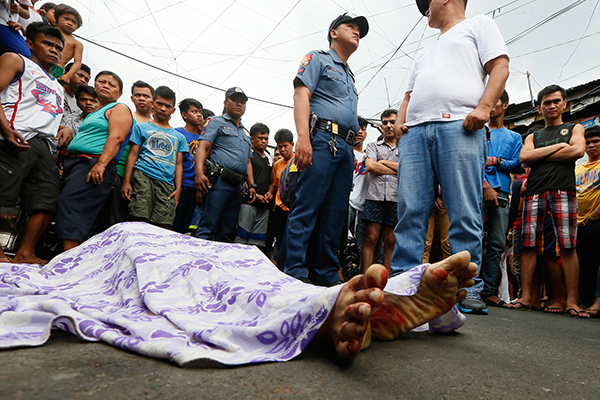8 of 10 Pinoys fear dying in drug war

Eight out of 10 Filipinos fear they might fall victim to extrajudicial killings amid the government’s all-out war against illegal drugs, a survey by pollster Social Weather Stations (SWS) revealed yesterday. AP Photo/Bullit Marquez, File
MANILA, Philippines - Eight out of 10 Filipinos fear they might fall victim to extrajudicial killings amid the government’s all-out war against illegal drugs, a survey by pollster Social Weather Stations (SWS) revealed yesterday.
Yet the same survey, taken face-to-face on Dec. 3 to 6, showed that Filipinos’ satisfaction with the Duterte administration’s campaign against illegal drugs remained “excellent” in the last quarter of the year and even slightly higher than in the third quarter, with 85 percent of respondents expressing satisfaction.
About 88 percent of the respondents also agreed that the drug problem in their communities has declined since President Duterte took office last June 30, with only four percent disagreeing, and nine percent undecided.
Seventy percent of the respondents said the administration is serious about solving the problem of extrajudicial killings in the country.
But 94 percent said it is important that suspects involved in illegal drugs trade be captured alive, unchanged from the previous survey.
The SWS fourth-quarter survey said 78 percent of 1,500 adult Filipinos said they are worried that they, or anyone they know, could become victims of extrajudicial killings.
Of the 78 percent, 45 percent said they were “very worried” and 33 percent were “somewhat worried.” Ten percent said they were “not too worried” and 12 percent said they were “not worried at all.”
But then, most or 85 percent of Filipinos said they were satisfied with the government’s campaign, while only eight percent were dissatisfied, yielding a net satisfaction of +77, slightly up from +76 last quarter.
The survey found that 69 percent of Filipinos consider extrajudicial killing as a serious problem in the present administration, consisting of 39 percent saying it is very serious and 30 percent saying it is somewhat serious.
Twenty-two percent of respondents were undecided on the issue, while six percent said it is “somewhat not serious,” and three percent, “it is not serious at all.”
The respondents, meanwhile, were divided on the claim of the Philippine National Police (PNP) that drug suspects resisted arrest, with 28 percent saying the police are telling the truth, 29 percent saying the police are not telling the truth, and the remaining plurality 42 percent unsure whether the police are telling the truth about drug suspects resisting arrest.
An average of 30 people have been killed daily in the past 167 days under the administration’s intensified campaign against crime, especially the illegal drugs trade, data from the PNP showed.
Records from the PNP also showed 2,102 drug pushers and users killed after allegedly fighting it out with police, and 2,886 others getting killed under sketchy circumstances and whose cases are listed as “death under investigation.”
“I am not surprised with the conundrum that people acknowledge that the anti-drug campaign is fitting, so they allow it. But they would like less killings,” said Ramon Casiple, executive director of the Institute for Political and Electoral Reform.
Communications Secretary Martin Andanar said the government recognized Filipinos’ concerns, but reiterated that the killings were not state-sponsored.
“Rest assured that the Duterte administration respects the law and upholds the basic rights of our people, regardless of beliefs and political persuasion,” Andanar said in a statement.
Lawlessness in our midst
Manila Auxiliary Bishop Broderick Pabillo, chairman of the Episcopal Commission on the Laity of the Catholic Bishops’ Conference of the Philippines (CBCP), said the latest SWS survey shows that lawlessness is getting hold of the country.
Pabillo said even before the SWS survey came out, the reported EJKs in the country should have already been a cause of concern.
“We really need to worry about EJK even without the survey result,” he said.
The prelate added that the problem of lawlessness in the country could no longer be contained, that even the government could no longer control the situation.
“Lawlessness is getting hold of the country and it is getting out of hand. The government is no longer in control,” Pabillo said.
“Somehow, we are not surprised that people will feel that way,” Fr. Roy Bellen of the Archdiocese of Manila Office of Communications said, citing reports of killings taking place in the country at present.
“At first, there are those who think that the killings are isolated cases, but now it has become a regular occurrence,” Bellen noted.
The priest said such sentiment of many Filipinos should serve as a wake-up call.
“There is no movement, program or advocacy greater than the value of life. Let us be reminded that the reason we endeavor to improve society is for the people, whether rich or poor, young or old, for the hopeful and desperate,” he said.
He added: “There are other non-violent ways of responding to the problems of drugs and poverty. And all begins with forming the values and the culture.”
Manila priest Fr. Jerome Secillano hopes that the survey would “start a massive public expression of indignation against extrajudicial killings.”
“People are now wary that this war on drugs is not fool proof. Anybody can be a target for a hit,” Secillano said.
He added that the police could be considered incompetent if they are not behind the unwarranted killings and incapable of stopping those behind the killings.
“If policemen are not the perpetrators of these unwarranted killings, then it shows their inefficiency in preventing them. They are inutile to say the least,” he said.
Institutional reforms at the PNP
Senators asked Duterte yesterday to immediately implement institutional reforms at the PNP and other law enforcement agencies to put an end to extrajudicial killings.
The lawmakers said they share the apprehension of a majority of Filipinos over the extrajudicial killings apparently triggered by the administration’s strong campaign against illegal drugs.
Sen. Grace Poe said the fear of Filipinos of getting fatally caught in the war against drugs was understandable with the growing number of innocents getting killed, and said this should jolt the administration into action.
“This fear is further fueled by the apparent inaction against the police officers involved in several questionable murder of unarmed victims, almost making these state-inspired killings,” Poe said.
“Sadly, one can’t help but think that such fear is exactly what the President wants to achieve as part of his solution to the problem,” she added.
She said the state has the duty to assure the people –“not by mere words but by positive actions” – that fighting crime with the might of the rule of law and ensuring the life of every Filipino is respected in the process.
Poe pushed for the strengthening of the PNP Internal Affairs Service to make it fully staffed and well-funded and an independent organization, as the police are widely believed to perpetuate extrajudicial killings.
Sen. Joel Villanueva said neither the government nor the public is sure that the over 3,000 killed vigilante-style since July 1 were all criminals because they were denied due process.
“Some of the victims are children. Surely, what is happening should really be a cause of concern and the recent survey is the affirmation of that,” Villanueva said.
He said there are studies that show more effective programs to fight illegal drugs and rehabilitate addicts.
Meanwhile, Senate Majority Leader Vicente Sotto III said the fear could be also due to the fact that Filipinos see the drug menace as a very widespread and serious problem. – Helen Flores, Evelyn Macairan, Paolo Romero
- Latest
- Trending


































